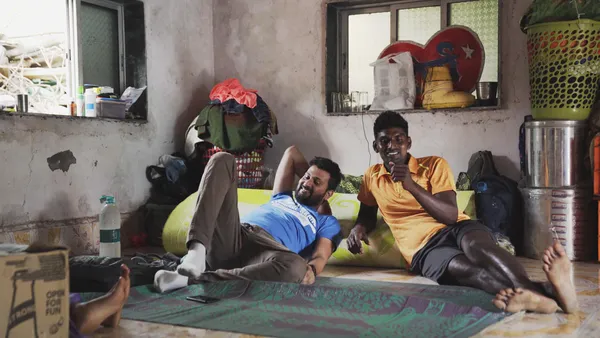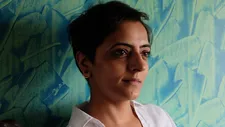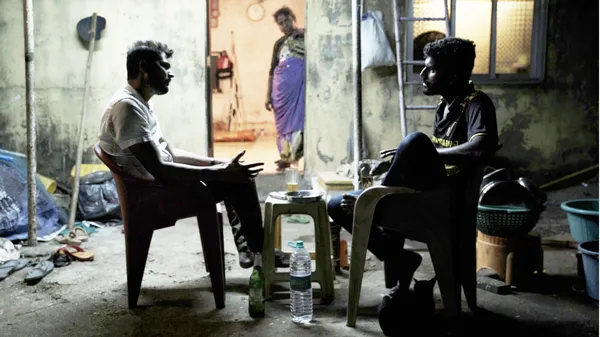 |
| Ganesh and Rakesh in Against The Tide |
Sarvnik Kaur’s latest documentary, Against The Tide, which is screening in the World Documentary Competition at Sundance, considers the increasingly precarious traditional life being led by Koli fishermen in Mumbai. The Koli fish according to traditional methods handed down the generations and we see the importance of ritual from childhood in this film. Kaur focuses on two Koli men who are good friends but who have taken very different approaches to their livelihoods. Rakesh is still living and fishing in the traditional fashion and is trying to cope with dwindling catches at the same time as discovering his newborn son has health problems. His friend Ganesh, who studied in Scotland, returned to a much less traditional way of fishing - on bigger boats and in deeper waters - but we soon see that it is no less under threat. Kaur’s film considers the interconnectedness of humans and our ecosystem as well as scrutinising the way traditional communities are being squeezed by the march of modernity. I caught up with Kaur ahead of her screenings at Sundance to chat about the film.
Can you tell me a bit about how you became involved with the Koli story?
Sarvnik Kaur: I was working on this film, which was my debut. I was in Kashmir, which is occupied by India. And while I was there, I started to read up about the story that was coming from Mumbai, the city where I live, which was about displacement of the Kolis. I started to see these strange kind of overlaps between Kashmir, this occupied land, and the story of the Kolis and I started to feel like displacement is done in so many different ways and forms. Sometimes it takes the form of nationalism, sometimes it's in the name of development.
I, myself, am a refugee child, my grandparents came from Pakistan. They were displaced from their homeland, my grandfather actually died dreaming of going back home, he never could. And so home has always been a very, very big subject for me. And my grandparents made a home for themselves. And then in 1983, big anti-Sikh riots happened in India, where our new home that we'd made was burned down. And my parents had to start over again. So I've grown up on these stories of, you know, packing up your bags, and moving again, for survival. And I've always lived next to a Koli village in Mumbai, and have had friendships in the village. So when I came back from Kashmir, I started to engage with this collective of Koli women. I wanted see to for myself what was happening.
 |
| Against The Tide director Sarvnik Kaur: 'My approach was very simple that I will be clear, honest about what we are trying to achieve and I think it resonated with them to a great degree' |
Of course, 200 women is nothing compared to all of the state machinery that can be put against any kind of protest of this kind. And I realised that so I started making some videos for them to gather public sentiment or civil involvement to their cause. And there was a woman who was a part of the collective who invited me over to her house, and that's when I met Rakesh. And we went fishing that day. And during that, that protest was when I met Ganesh, you know, and it was just like, for me, it was night and day. While I was engaging with the Koli women's collective, I realised that there is a language that people have kind of become deaf to and which makes the resistance that they're putting up almost seemed like a wrench. People have become kind of desensitised to the language of protest.
Ganesh, on the other hand, was a community leader talking the modern language - I understood his vocabulary. He spoke about chemical pollution and he spoke about how Kolis are the guardians of the mangroves, the sea but also all of the city. He was talking about climate change. He was talking about how the city will drown by 2035 if Kolis were not given their due because they are the last bastion against the drive of development, and it made my skin crawl.
Coincidentally, a week later, I visited Rakesh and there is Ganesh. They're sitting and drinking together. And I was like, What? What is happening? Yeah. And that's how the story started to form. And between their two ideologies, I saw friendship, they were poles apart, and yet they were drinking together. They were arguing and yet they would, they were breaking bread together. I still did not yet did not know where the story was leading until I went to a talk organszed by CMFRI, which is like the ocean research wing of Mumbai. And the scientists who were talking to fishermen and were telling them how to fish sustainable methods of fishing. And it made me want to scoff like,’What are you teaching to fishermen, they know, you use their data to arrive at your studies and to arrive at your valuations. Sadly, a big fight broke out and I realised there were two factions amongst the Kolis. There were the modern Kolis, and there were the traditional Kolis. And between them, there was a disagreement, it seemed that they both blamed each other for lack of fish. So the supposed modern Kolis were the Kolis who were going into the deep sea, who were blaming the traditional Kolis of catching juvenile fish, and the traditional Kolis were blaming the modern Kolis for catching industrial quantities of fish.
You shoot with a fly-on-the wall style, at what point did you decide to do that because that brings some challenges in terms of the storytelling and bringing those factors that you're talking about into play.
SK: I feel like people are blind and deaf to causes now, they've had too many causes. There is, and it's not because I'm blaming people, it's just that's what life is. I mean, that's what the capitalist world brings you. Your own struggle is so much, that you barely have any heart empathy or sympathy left for anyone else's misery cause. The idea was to be an eye level, to be able to put yourself in their place and see the choices that they're making - what choice would we make if we were in that place? I wanted to tell this film in a way and manner where these boundaries of fiction and nonfiction were lost and where you could really live the life of the character as it was being lived. So the approach was to be honest and clear with my characters. My approach was very simple that I will be clear, honest about what we are trying to achieve and I think it resonated with them to a great degree. And so there was a friendship, respect or love for what I was doing and their struggle for survival, how I was struggling and the struggle for survival started to mirror at some point of time and that gave me an incredible amount of access. This was love, actually, at every step of the way.
 |
| Sarvnik Kaur: 'Between their two ideologies, I saw friendship, they were poles apart, and yet they were drinking together' |
The fact that the camera could be forgotten. That the three of us, that is my camera, me and my sound were accepted as family members so our presence would be forgotten. That was elementary for us. And so being a very small group, never changing our core to being the same people and being extremely respectful and honest about what we were trying to achieve every step of the way. It's been a five-year process. I also realised that my creativity is very limited, and their lives are infinite so there is nothing that I could impose onto their lives, or I could bring that wasn't already being lived. I think there is no clever answer to how this approach was formed. It was very, very organic. It happened over a long period of time. And I think this film could only have been made because there was five years spent on it.
At moments, for example, when Ganesh is talking to his wife it's obviously quite an intimate conversation that they're often having. But they just were so used to you being there, I presume, by that point, that they almost forgot that you were there with the camera.
SK: Yes. And also I may have been working with the men, but it was the confidence of the women that was very important to me. It's also the state of Indian marriages, so to say. Often women are forgotten in the marriage. In this whole earning a livelihood, man's given this position of power, you know, he could do no wrong because life has to be sustained, because family has to be provided for. I think we became friends, confidantes and also a source of catharsis. When there was no voice, the camera kind of became an agent for deep grievances to be voiced. And so yes, men were my characters, but my allies were the women.
Obviously, the LEDs are illegal, which is highlighted in the film. But I wondered, you know, was Ganesh just willing to have you go with him when he was using those? Because that was a risk to him let you capture him using something that was illegal?
SK: Like I said, five years was spent doing this in that five long years, I've seen him deal with this ethical question of whether to LED or not to LED. He's also a community leader, he's an influencer. He's been working with the government to change policies. And, and for him, it was important for the world to see how LED is done, and why it is done, and how people are made and how their arms are twisted into doing it.
So to a large degree, Ganesh’s story is a more complex story, in the sense of it's the story of the modern man, the man who's accepted technology who is not following tradition, so to say, and is forming a way apart for himself, but who's the person? And what are the choices? Who's defined as a person? And what are those choices that are given to that person? Is a tribal man or an indigenous man allowed to have an ambition? Or is he not? Who should be practicing sustainability and who shouldn't be? These were questions that he very deeply intellectually analysed as we were working with the film, actually, after we made the film and
I screened the film to the two of them, he went quiet. And then the next day he called me and Ganesh said, ‘I went quiet, because thank you for making such a pure film’, and it was very important for me for for me, to have that feedback from him because of what you say the risk involved. It is an illegal activity and that the film could project the conundrum that he was in and the forces of the times that he's living in that arm twisted him into finally accepting and giving in was something very critical to him.
This is what helps him take the case of his people forward. Right now even the form of fishing that they do has been banned by the government. Mumbai doesn't care about fishing as an industry. It has other industries, it's got finance, it's got Bollywood, it's got to real estate. So for Mumbai, for Maharashtra fishing is not a primary source of GDP.So it's much rather that fishing is corporatised. And, therefore, the story actually helps Ganesh’s calls in a big, big way, because that is how he gets to lobby for his people and for his livelihood.
Against The Tide is currently seeking distribution and we'll be bringing you the second part of our chat with Kaur at a later date.





















